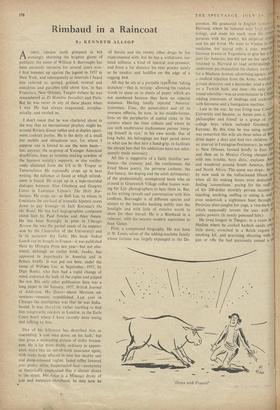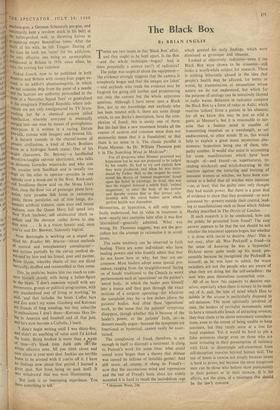Rimbaud in a Raincoat
By KENNETH ALLSOP AGREY, opaque moth glimpsed in but seemingly shunning the brighter glares of publicity, the name of William S. Burroughs has been curiously intrusive for several years now. 1 first bumped up against the legend in 1957 in New York, and subsequently at intervals 1 heard him referred to, quoted, praised, revered and anecdotes and parables told about him, in San Francisco, New Orleans, Tangier (where he was remembered as El Hombre Invisible) and Paris. But he was never in any of these places when I was. He had always evaporated, ectoplas- mically, and swirled on.
I don't mean that he was chattered about in the way that an international playboy might be, around Riviera dinner tables and at duplex apart- ment cocktail parties. He is the deity of a small but mobile and ubiquitous sect, for whom I suppose one is forced to use the term beats— but, anyway, the in-group of Younger American disaffiliates, busy as termites making sawdust of the business society's supports, or else vocifer- ously alienated from the US in St. Tropez or Torremelinos. He repeatedly crops up in beat writing, the talisman or fount at which refresh- ment is found. He crops up in a tape-recorded dialogue between Alan Ginsberg and Gregory Corso in Lawrence ,Lipton's The Holy Bar- barians. He crops up—as Bull Lee, to whom in Louisiana the car-load of nomadic hipsters zoom down to pay homage—in Jack Kerouac's On the Road. He has had hagiographies composed about him by Paul Bowles and Alan Ansen. He has been fleetingly in print in Chicago Review (he was, the partial cause of its suppres- sion by the Chancellor of the University) and in its successor Big Table. His book Naked Lunch can be bought in France—it was published there by Olympia Press last year—but not else- where, although an earlier book, Junkie, has appeared in paperbacks in America and in Britain briefly. It was put out here, under the name of William Lee, in September, 1957, by Digit Books, who then had a rapid change of mind, exported the'bulk of the copies and pulped the rest. His only other publication here was a long paper in the January, 1957, British Journal of Addiction. His Queer—about Mexican ad- ventures—remains unpublished. Last year in Chicago the intelligence was that he was India- bound. It was, therefore, rather startling to find him temporarily resident in London, in the Earls Court hotel where I have recently been seeing and talking to him.
One of his followers has described him as resembling 'a con man down on his luck,' but that gives a misleading picture of shifty brazen- ness. He is far more drably ordinary in appear- ance, more like an out-of-work insurance agent, with reedy body effaced in neat but shabby suit and dung-coloured raglan, faded trilby lowered over peaky, white, bespectacled face—anonymity so theatrically emphasised that it almost shouts in the street. His voice is a Missouri drone of jazz and narcotics shorthand; he may now be off heroin and the twenty other drugs he has experimented with, but he has a withdrawn, iso- lated stillness, a kind of spectral non-presence. and from a far distance his eyes ponder palely as he smokes and huddles on the edge of a sagging bed. All day he sits at a portable type4riter 'taking dictation'—that is, writing: allowing the random words to spate on to sheets of paper, which are not numbered because they have no especial sequence. Having totally rejected 'America' (automats, Time, the power-elite) and all its overseas effluvia, he now, in his middle-forties. lives on the peripheries of capital cities, in the corners where the litter collects and where he can with unobtrusive studiousness pursue 'steep- ing himself in vice,' in his own words. Out of long habit, his belongings are kept pared down to what can be shot into a hand-grip, to facilitate the abrupt lam that his addictions have not infre- quently made necessary.
All this is suggestive of a fairly familiar am- bience—the crummy pad, the rootlessness, the Fried Shoes poetry, the perverse coolness, the Zen-lunacy, the doping and the adult delinquency of the professionally unemployed beats who sit around in Greenwich Village coffee houses wait- ing for Life photographers to hem them in. But, as his writing revealg and conversation with him confirms, Burroughs is of different species and stature to the beatniks backing surlily into the limelight and with little of creative worth to show for their travail. He is a Rimbaud in a raincoat, with his nearest modern equivalent in Jean Genet.
First, a compressed biography. He was born in St. Louis, scion of the adding-machine family whose fortune was largely expunged in the De- pression. He graduated in English Harvard, where he tinkered with Yu; i .11d et nology, and made his mark -kpon s'Inte poraries with his poetry, his elliptical inlell and his pet ferret. He went to Vienna to st medicine, but stayed only a year, married German Jewess in Yugoslavia to give her a P3 port for America, but did not see her again. returned to Harvard to read anthropologY. underwent psychoanalysis (in chains), wrote e° for a Madison Avenue advertising agency. 04 a medical rejection from the Army, worked a' private detective and a bartender, tried a stick' e on a Turkish bath, and then—the only fob tl found tolerable—was an exterminator in Chie31 a ridding tenements of bedbugs and cockroact is with kerosene and a fumigation machine.
Late in the war, he was living near Colurn University and became, as Ansen puts it, 'Su philosopher and friend' to a group of Yon college boys which included Ginsberg a. Kerouac. By this time he was using narcell' was remarried (his wife ate three tubes of Beni drine paper a day) and had two children. Aft an interval in Lexington Penitentiary, he migrat to New Orleans, farmed briefly in East Te' and then on to Mexico ('living cheaper, d` with less trouble, boys ditto,'. explains Anse and wandered around South America, Euro and North Africa. The quest was dope: he 1' by now sunk in the hallucinated fifteen Yea when all his waking hours were dedicated finding 'connections,' paying for the stuff of his 200-dollar monthly private income 3 injecting, smoking, sniffing or eating it, and even undertook a nightmare hunt through t Peruvian slum-jungles for yage, a vine-bark 0 which supposedly invests the user with te' pathic powers. (It nearly poisoned him.) He lived longest in Tangier, in a room in 11/ Medina where he cooked hashish candy oyez little stove, crouched in a Reich orgone 1/` smoking kif, and practising shooting with 0 gun or rifle (he had previously owned a sti 'tt tit
'Down with Franco!'
machine-gun, a German Scheintoth gas-gun, and customarily kept a revolver stuck in his belt) at the bullet-pocked wall, or throwing knives at propped-up empty Benzedrine tubes. After the death of his wife, he left Tangier. During all this time he took ten 'cures' for his addiction, the only effective one being an apomorphine withdrawal in Britain in 1956, since when, be says, the craving has vanished.
Naked Lunch, now to be published in both America and Britain with twenty-four pages ex- cised, is an addict's phantasmagoria, in which the sad ecstasies drip from the point of a needle ticaft and the horrors are authority personified in the ,Licr or of a Narcotics Squad 'fuzz' or generalised to his imaginary Freeland Republic where indi- viduals are not only amalgamated by TV brain- washing but by a chemical process called liquefaction whereby everyone is eventually merged into one man by means of protoplasmic absorption. It is written in a racing, literate jive-talk, riotous with imagery and fevered life. It is berserk comedy in the charnel-house of present civilisation, a kind of Marx Brothers 'farce in a hydrogen .bomb crater. One of his :■( , major characters, Dr. Benway—a hardboiled • 'Brooklyn-toughie cut-rate abortionist, who talks in demonic Groucho wisecracks and who cuts the cocaine with Saniflush and is usually too 'high on the ether to operate—presides in one episode over a break-out in the West. Rock-and- ' roll hoodlums throw acid on the Mona Lisa's face, chop the floor out of passenger plane lava- tories, turn piranha fish loose in swimming Pools, throw paralytics out of iron lungs, dis- connect artificial kidneys, open zoos and insane asylums, ram the Queen Mary full speed into New York harbour, sell adulterated shark re- Pellent and file elevator cables down to one thin wire. . . . It is a vision lunatic and, once You've met Dr. Benway, hideously logical.
Now Burroughs is working on a sequel en- su Mr. Bradley Mr. Martin—`about methods of control and interplanetary conspiracies'— and written partially by the cut-up method de- veloped by him and his friend, poet and painter, Brion Gysin, whereby sheets of text are sliced vertically, shuffled and reassembled as they come.
This, he explains, busies him too much to con- cern himself closely with being a father-figure to the beats. 'I don't associate myself with any Movements, groups or political programmes, with any standardised way of living or working,' he said, 'and that includes the beats. Coffee bars and Zen aren't my scene. Ginsberg and Kerouac are friends of long standing, but they subscribe to enthusiasms I don't share—Kerouac likes liv- ing in America and baseball and all that jazz, and he's now become a Catholic, I learn.
`I didn't begin writing until I was thirty-five, and didn't do anything of value until I'd kicked the habit. Being hooked is more than a,waste of time—it's blank time. Junk cuts atIrthe Whole effective area. All you think about and care about is your next shot. Junkies are terrible bores to be around with if you're off it. I have 00 feelings now about that period. I learned a great deal. Not from being on junk itself. It Was withdrawal that was most illuminating.
`But junk is an interesting experience. You have something to tell.'



































 Previous page
Previous page